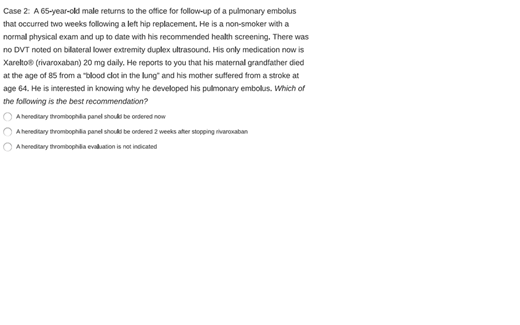Introduction:
There has been increasing recognition of various laboratory markers of thrombophilia that are associated with increased risk of thrombosis either through hereditary (i.e. Factor V Leiden, prothrombin G20210A mutation, and protein C, S, and antithrombin deficiencies) and/or acquired means (i.e. antiphospholipid antibodies) over the past decades. Availability of thrombophilia biomarkers has the potential to lead to inappropriate testing and treatment.
Methods:
An online anonymous questionnaire was sent to all providers in the Tower Health System asking them about their practice, specialty, degree, years in practice, and basic questions regarding their comfort and frequency of prescribing anticoagulants. The questionnaire also asked the providers how they would manage ten various clinical scenarios related to anticoagulation management. One question specifically asked whether a hereditary thrombophilia panel should be ordered for a 65-year-old with provoked VTE and no concerning family history of VTE. Analysis of variance was used to compare the scoring means between groups while linear regression and Pearson's correlation coefficient measured the relationship between years of practice and test scores.
Results:
Out of 404 responders, 170 (42.1%) inappropriately ordered a hereditary thrombophilia panel on the question (see Figure 1) that addressed this topic. 53.6% and 35% of the outpatient and inpatient physicians answered the question incorrectly which was statistically significant (p value 0.026).
Conclusion:
This project suggests a professional practice gap in which overtesting might be ordered. In particular, this study found a statistically significant difference between inpatient and outpatient providers in the ordering of a thrombophilia panel. Whether just-in-time reminders or other educational interventions could close this gap is a matter for further study.
No relevant conflicts of interest to declare.
Author notes
Asterisk with author names denotes non-ASH members.


This feature is available to Subscribers Only
Sign In or Create an Account Close Modal